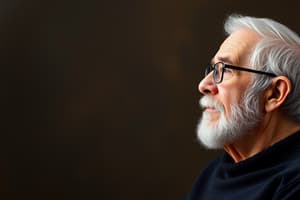Podcast
Questions and Answers
Which statement best describes unconditional positive regard?
Which statement best describes unconditional positive regard?
- Acceptance of a person based on their achievements.
- Only accepting someone when they meet certain expectations.
- Accepting someone for who they are, without judgment. (correct)
- Loving someone conditionally based on their behavior.
What aspect of self does Erving Goffman focus on with the concept of 'Front Stage Self'?
What aspect of self does Erving Goffman focus on with the concept of 'Front Stage Self'?
- The hidden emotions that individuals do not express.
- The authentic self that people show to close friends.
- The roles that individuals play in private settings.
- The version of self one presents to outsiders. (correct)
How does Bronfenbrenner's Bioecological Systems Theory differ from an individualistic perspective?
How does Bronfenbrenner's Bioecological Systems Theory differ from an individualistic perspective?
- It emphasizes personal traits over environmental interactions.
- It incorporates systemic interactions between individuals and their environments. (correct)
- It disregards external influences on behavior.
- It focuses only on familial relationships.
What does the term 'kapwa' signify in Filipino culture?
What does the term 'kapwa' signify in Filipino culture?
Which of the following is NOT a characteristic included in understanding the holistic self according to Bronfenbrenner?
Which of the following is NOT a characteristic included in understanding the holistic self according to Bronfenbrenner?
What does empathy entail in interpersonal relationships?
What does empathy entail in interpersonal relationships?
What is the primary focus of the 'Back Stage Self' in Goffman's dramaturgical perspective?
What is the primary focus of the 'Back Stage Self' in Goffman's dramaturgical perspective?
Which component is most directly related to the 'Proximal Processes' in understanding the holistic self?
Which component is most directly related to the 'Proximal Processes' in understanding the holistic self?
Flashcards
Real Self
Real Self
A continuous process of personal growth, not a final state.
Conditional Positive Regard
Conditional Positive Regard
Acceptance based on meeting specific expectations.
Unconditional Positive Regard
Unconditional Positive Regard
Acceptance without conditions or judgments.
Dramaturgical Perspective
Dramaturgical Perspective
Signup and view all the flashcards
Front Stage Self
Front Stage Self
Signup and view all the flashcards
Back Stage Self
Back Stage Self
Signup and view all the flashcards
Bioecological Systems Theory
Bioecological Systems Theory
Signup and view all the flashcards
Microsystem
Microsystem
Signup and view all the flashcards
Study Notes
The Self as a Paradox
What It Means To Become A Person (Rogers, 1961)
- Real self is viewed as a continuous process rather than a final destination.
- Conditional positive regard prevents individuals from achieving their true selves by imposing specific expectations.
- Example of conditional positive regard: “You need to get an A in all your subjects” emphasizes performance over acceptance.
- Unconditional positive regard promotes acceptance without judgment, exemplified by expressions like “I love you for who you are.”
- Empathy involves understanding and sharing another person's experiences.
- Genuineness is characterized by authentic interactions with others.
Presentation of Self In Everyday Life (Goffman, 1991)
- Dramaturgical perspective suggests individuals perform various roles in social interactions.
- Front stage self is the persona crafted to make a favorable impression on others during initial encounters.
- Back stage self reveals a more authentic version of an individual shared with familiar relationships.
- Goffman posits that a singular "real self" does not exist; instead, self-presentation varies by context.
Alejo and Bronfenbrenner
Loob (Alejo, 2020)
- "Loob" is conceptualized as a complex world of consciousness and emotions rather than just an internal corner.
- Encourages pursuing experiences that enhance understanding of self and surroundings.
- Key Filipino traits highlighted include kapwa (shared identity) and pakikipagkapwa (engagement with others).
Bioecological Systems Theory (Bronfenbrenner)
- Advocates for a shift from individualistic views to a more systemic understanding of self.
- Emphasizes interdependence and the principle of reciprocity in human interactions.
- Proximal processes highlight the importance of reciprocal, evolving interactions within one’s environment.
- Individual characteristics and internal motivational drives play a critical role in one's development.
Contextual Systems
- Microsystem: Direct interactions within immediate spaces (e.g., family, friends).
- Mesosystem: The connections between different aspects of the microsystem (e.g., parents meeting friends).
- Exosystem: External factors that indirectly affect the individual (e.g., parents’ job stress influencing family dynamics).
- Macrosystem: Broader societal influences including ideologies, laws, and cultural traditions.
- Chronosystem: The impact of sociohistorical events over an individual's lifespan, emphasizing the element of time in development.
Studying That Suits You
Use AI to generate personalized quizzes and flashcards to suit your learning preferences.
Description
Explore the complexities of becoming a person as outlined by Carl Rogers in 1961. This module delves into the concepts of conditional and unconditional positive regard, and the role of empathy in personal development. Test your understanding of these fundamental psychological principles.




